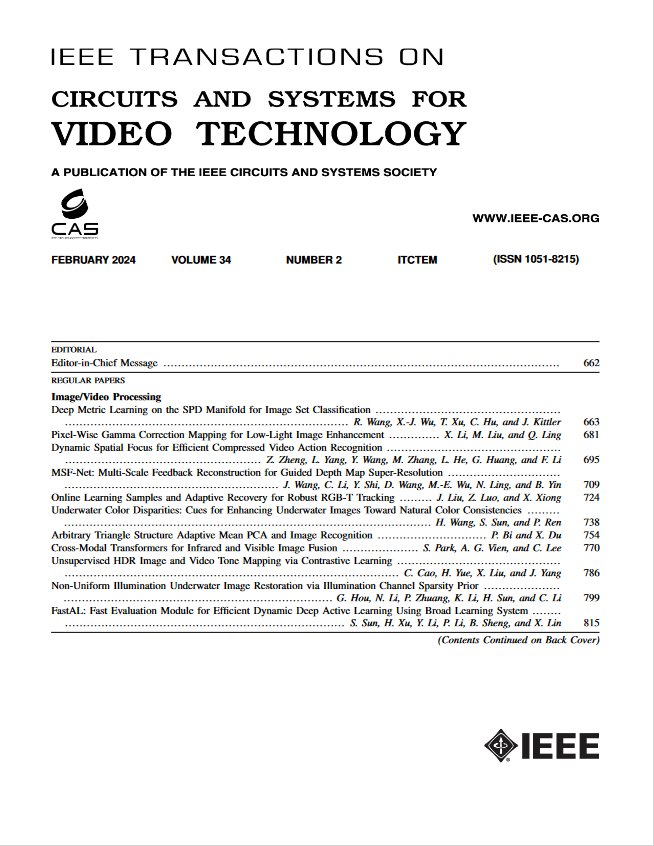Flexible Temperature Parallel Distillation for Dense Object Detection: Make Response-Based Knowledge Distillation Great Again
IF 8.3
1区 工程技术
Q1 ENGINEERING, ELECTRICAL & ELECTRONIC
IEEE Transactions on Circuits and Systems for Video Technology
Pub Date : 2025-01-03
DOI:10.1109/TCSVT.2024.3525051
引用次数: 0
Abstract
Feature-based approaches have been the focal point of previous research on knowledge distillation (KD) for dense object detection. These methods employ feature imitation and result in competitive performance. Despite being able to achieve comparable performance in image recognition, response-based KD methods can not reach the same level in dense object detection. Inspired by improving distillation performance from two key aspects: where to distill and how to distill, in this paper, a parallel distillation (PD) is introduced to fully utilize the sophisticated detection head and transfer all the output responses from the teacher to the student efficiently. In particular, the proposed PD takes an important consideration of the specific location of distillation, which is crucial for effective knowledge transfer. Regarding the discrepancies in output responses between the localization branch and the classification branch, we propose a novel Dynamic Localization Temperature (DLT) module to enhance the precision of distilling localization information. As for the classification branch, a Classification Temperature-Free (CTF) module is also designed to increase the robustness of distillation in heterogeneous networks. By incorporating the DLT and CTF into the PD framework to avoid setting temperature values manually, the Flexible Temperature Parallel Distillation (FTPD) is proposed to achieve a state-of-the-art (SOTA) performance, which can also be further combined with mainstream feature-based methods for better results. In terms of accuracy and robustness with extensive experiments, the proposed FTPD outperforms other KD methods in the task of dense object detection.面向密集目标检测的柔性温度并行蒸馏:使基于响应的知识蒸馏再次伟大
基于特征的方法一直是知识蒸馏(KD)在密集目标检测中的研究热点。这些方法采用特征模仿,从而产生具有竞争力的性能。尽管基于响应的KD方法能够在图像识别中达到相当的性能,但在密集目标检测中无法达到相同的水平。从蒸馏位置和蒸馏方式两个关键方面改进蒸馏性能的启发,本文引入了平行蒸馏(PD),以充分利用先进的检测头,并有效地将教师的所有输出响应传递给学生。特别地,所提出的PD考虑了蒸馏的具体位置,这对于有效的知识转移至关重要。针对定位分支和分类分支输出响应的差异,提出了一种新的动态定位温度(DLT)模块来提高定位信息提取的精度。在分类分支中,设计了CTF (classification Temperature-Free)模块,提高了异构网络中蒸馏的鲁棒性。通过将DLT和CTF结合到PD框架中,避免手动设置温度值,提出了柔性温度平行蒸馏(FTPD),以实现最先进的(SOTA)性能,也可以进一步与主流基于特征的方法相结合,以获得更好的结果。经过大量的实验,在精度和鲁棒性方面,本文提出的FTPD在密集目标检测任务中优于其他KD方法。
本文章由计算机程序翻译,如有差异,请以英文原文为准。
求助全文
约1分钟内获得全文
求助全文
来源期刊
CiteScore
13.80
自引率
27.40%
发文量
660
审稿时长
5 months
期刊介绍:
The IEEE Transactions on Circuits and Systems for Video Technology (TCSVT) is dedicated to covering all aspects of video technologies from a circuits and systems perspective. We encourage submissions of general, theoretical, and application-oriented papers related to image and video acquisition, representation, presentation, and display. Additionally, we welcome contributions in areas such as processing, filtering, and transforms; analysis and synthesis; learning and understanding; compression, transmission, communication, and networking; as well as storage, retrieval, indexing, and search. Furthermore, papers focusing on hardware and software design and implementation are highly valued. Join us in advancing the field of video technology through innovative research and insights.

 求助内容:
求助内容: 应助结果提醒方式:
应助结果提醒方式:


